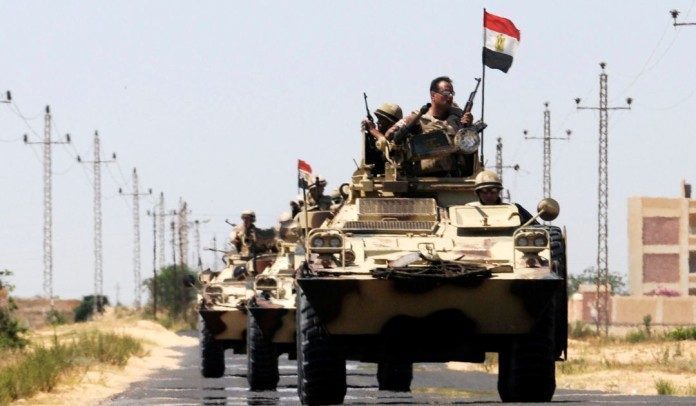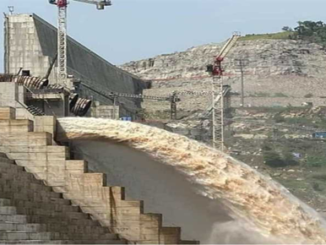
A group of officers from the Egyptian Army traveled to the port-city of Tartous, Syria on Tuesday to train with Russia’s military advisors near the Islamic State’s front-lines, reported Al-Masdar News (AMN), a news site concerned with the Syrian issue.
Al-Masdar News claimed it quoted some local activists saying that the Egyptian officers were accompanied by Russian military personnel upon their arrival to Tartous on Tuesday.
It is noteworthy that the Syrian National Security Bureau chief Ali Mamlouk made an official visit to Cairo in October 2016 where he met with General Khaled Fawzy, the head of Egypt’s General Intelligence Service, as well as other senior security officials.
Syria’s state news agency SANA had reported that “The two sides agreed to coordinate political stances,” adding that they also decided to “strengthen coordination in the fight against terrorism.”
In addition, Egypt has recently announced that it would assist the Syrian regime in the siege of Aleppo by helping to deliver aid, as reported by al-Arabi al-Jadeed.
In fact, the Egyptian, Russian and Syrian militaries have not confirmed these reports; however, if true, it would definitely intensify the dispute between Egypt and its financial backer Saudi Arabia on the Syrian file.
The Egyptian Saudi relations have undergone serious tensions as a result of Egypt’s vote in favor of a Russian-backed draft resolution in the UN Security Council on Syria, which was opposed by Saudi Arabia.
As a result, Egypt’s stance has angered Egypt’s major Gulf backer which condemned Egypt’s vote and described it as a “painful” stance.
After the voting, the Saudi ambassador to the UN, Abduallah al-Mouallimi said, “It was painful that the Senegalese and Malaysian stance was closer to the Arab’s consensus than the Egyptian delegation.”
He also said that he feels pity for these countries that voted for the Russian resolution, stressing that his country will continue backing the Syrian people by all means.
Two days following the voting, Saudi state-owned oil company Aramco announced halting oil product supply to Egypt. The sudden halt, triggered a scornful media campaign against Saudi Arabia, as it was seen as a political decision. On the other side, Saudi journalists and media men criticized the Egyptian regime and blamed the kingdom or its financial generosity to al-Sisi regime.
Egypt’s policy shifts and closeness towards Russia have been traced recently by observers. After al-Sisi’s military coup in 2013 against Egypt’s democratically elected President Mohamed Morsi, the Egyptian-Russian relations have flourished on different levels, and recently the two countries started to expand their cooperation on different levels of common interests.
In addition, Egypt opened its market widely to the Russian imports in an unprecedented way. Egypt will import wheat from Russia after it gave up the zero-ergot policy that led to a trade dispute between both countries months ago but it was soon resolved when Egypt surrendered by declaring that it has been agreed to return to the old policy which allows the international standards up to 0.05% of ergot-infection in imported wheat shipments.
Egypt’s Ministry of Agriculture and Land Reclamation also approved 13 slaughterhouses in Russia to start importing meat and poultry on 7 October 2016.
The step is a first, as Egypt has never imported similar commodities from Russia before.
Experts see the approval as a step towards improving the political relationship between Egypt and Russia before the economic one.
On the military level, Russia and Egypt held their first ever joint military exercise in mid-October 2016. In addition, both countries have signed several arm deals during al-Sisi reign.
Egypt’s Armed Forces have previously signed an arms deal with the Russian Rosoboronexport armaments company for the sale and delivery of 46 attack helicopters.
Retired Colonel Viktor Murakhovsky said that Moscow and Cairo has been recently building a very close and trusting relationship. He said,” This is evidenced by the purchase by Egypt of France’s Mistral helicopter carriers with pre-installed Russian equipment, which were originally destined for the Russian army.
Last September, a high-ranking Egyptian military delegation headed to Russia for meetings and discussions on bilateral military cooperation between the two countries. Egypt’s military delegation to Russia included Minister of Defense Sedky Sobhy and Minister of Military Production Mohamed Al-Assar.
This was the third meeting held by the Egyptian-Russian military committee. The first meeting took place in February when a Russian military delegation visited Cairo, and the second meeting was in Russia headed by Al-Assar.
During the visit, the Russian Industry and Trade Minister Denis Manturov said on the sidelines of the Army 2016 international military-technical forum, “Russia is considering an opportunity to start servicing military hardware in Egypt as well as localize military production in that country.”
The Russian industry and trade minister met with Egyptian Defense Minister Sedky Sobhy and Military Production Minister Mohamed al-Assar at the Army 2016 forum.
“Army-2016” -a large-scale military exhibition- has opened outside Moscow, bringing together Russian defense industry and research representatives, and delegates from 80 countries. The Army-2016 military and technical forum will showcase the latest developments in weapons, military vehicles and technology for five days.
If the reports about sending Egyptian officers were confirmed, in the light of the Egyptian Russian rapprochement, it is likely to raise questions about the repercussions of this move, and its impact on the future of Egypt’s relations with the Gulf countries, and the United States of America.



